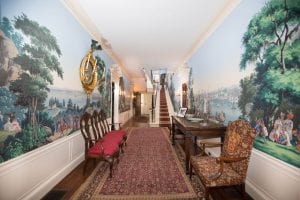 Les Vues d’Amérique du Nord: Artists Respond (2021-2023) is an artist residency inviting two Rhode Island-based artists, Jazzmen Lee-Johnson and Deborah Spears Moorehead, to create site-specific artworks that respond to the Center for Public Humanities’ historic wallpaper, Les Vues d’Amérique du Nord. Created by Jean-Julien Deltil and printed in 1834 by Zuber & Cie in France, it was installed in the Nightingale-Brown House in the 1920s by the Brown family when it was their home. It was reinstalled in the 1990s after substantial renovation to the building when the Nightingale-Brown House was transferred from the Brown family to Brown University. Several panels of the wallpaper show exoticized Indigenous dancers performing for a group of curious white onlookers, while others show a group of Black people in conversation, also surrounded by white onlookers, that was based on a well-known printed racist caricature of the time.
Les Vues d’Amérique du Nord: Artists Respond (2021-2023) is an artist residency inviting two Rhode Island-based artists, Jazzmen Lee-Johnson and Deborah Spears Moorehead, to create site-specific artworks that respond to the Center for Public Humanities’ historic wallpaper, Les Vues d’Amérique du Nord. Created by Jean-Julien Deltil and printed in 1834 by Zuber & Cie in France, it was installed in the Nightingale-Brown House in the 1920s by the Brown family when it was their home. It was reinstalled in the 1990s after substantial renovation to the building when the Nightingale-Brown House was transferred from the Brown family to Brown University. Several panels of the wallpaper show exoticized Indigenous dancers performing for a group of curious white onlookers, while others show a group of Black people in conversation, also surrounded by white onlookers, that was based on a well-known printed racist caricature of the time.
Deltil never visited the United States, so he relied on travel accounts and prints to construct this series of North American vignettes, which include scenes of Boston Harbor, West Point, Niagara Falls, and the Shenandoah Valley. The same wallpaper was installed by Jacqueline Kennedy in the Diplomatic Room of the White House, and it remains in print by Zuber to this day.

A group of Public Humanities graduate students in 2019 petitioned the Center and Brown University to remove “this racialized and racist wallpaper from the space where we study, work and socialize.” This residency provides an opportunity for artists to respond critically to the iconography of Les Vues, and to offer a new perspective on the North American landscape. This project is funded in part by the Brown Arts Institute’s Lawton Whele Fitt ’74 Artist-in-Residence Endowment. Deborah Spears Moorehead’s artwork will be installed at the Center for Public Humanities in September, 2022.
Jazzmen Lee-Johnson, Not Never More (2022)
Lee-Johnson’s residency culminates in Not Never More, a series of prints installed in the Public Humanities Center from April 28 – September 30, 2022. Lee-Johnson is a visual artist, scholar, composer, and curator. Her practice centers on the interplay of animation, printmaking, music, and dance, informed by a yearning to understand how our current circumstance is tethered to the trauma of the past. Through her visual, sonic, and movement investigations across time and technology she disrupts and asserts ideas of history, body, liberation, and otherness. Above all she is interested in redistributing the privileges that allow her to maintain her creative and scholarly practice.
Lee-Johnson received her BFA in Film, Animation, and Video at RISD, her MA in Public Humanities at Brown University, and a heavy dose of education working with youth in Baltimore, South Africa, New York City and Providence. She has curated exhibitions at the Chinese University of Hong Kong; Artist Proof Studio and the ABSA Art Gallery in Johannesburg, South Africa; RISD Museum; and Brown University Center for the Study of Slavery and Justice, where she was also a Public History of Slavery Fellow. As the 2019 inaugural Artist in Residence at the Rhode Island Department of Health she utilized the arts to confront health disparities. She was the 2020 Artist Fellow at the RISD Museum making work in response to the collection. As an inaugural grantee of the Interlace Grant Fund she is currently working on a series called Contraband, which focuses on how the industry of slavery laid the blueprint for drug crimes, illicit economies, substance use disorder, and mass incarceration in Black communities, based on her research as artist fellow at the American Antiquarian Society.
Artist’s Statement: We inhabit our histories. We feel the pains of the past, we clang in its echoes, feel its residue caked up on our skin. History’s traumas have been perpetually erected in monuments, embedded in street names, stone walled in woodlands, hung, stacked, and plastered in architecture. Not Never More is my gut reaction and visual response to confronting such an architecture—the problematic 19th century French wallpaper Les Vues d’Amérique du Nord (The Views of North America), created in 1834 by Jean-Julien Deltil. This wallpaper adorns the foyer and staircase of the John Nicholas Brown Center for Public Humanities and Cultural Heritage which is situated in the historic Nightingale-Brown House. Deltil’s wallpaper obfuscates colonialism, genocide, capitalism, and slavery, in its romanticized idyllic nostalgic imagery. My response, Not Never More, is a textile print/quilt installation that remixes, conceals, reveals, and warps this historically fraught and imperialist imagery into layers of possibility, braggadocio, pessimism, blunt historical moments of shame/ contradiction, dance, and critical optimism.
Artwork credit, web banner: Detail, Jazzmen Lee-Johnson, Not Never More (2022)
